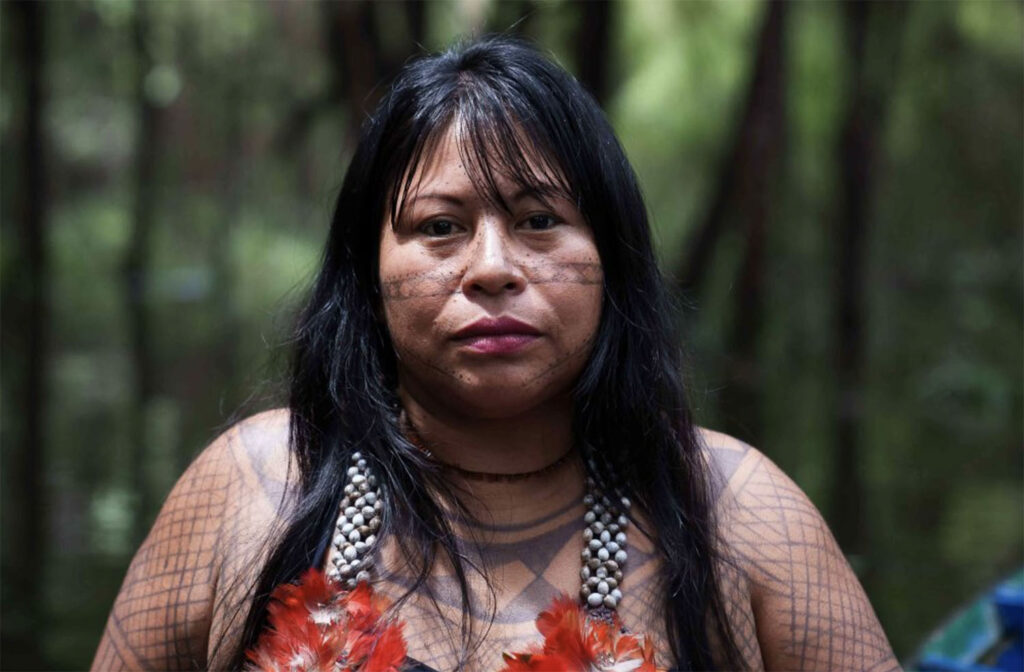By Alexandra Greer
Every year the Goldman Environmental Prize awards the work of “ordinary people doing extraordinary things” for environmental protection, and one of this year’s winners was Brazilian indigenous leader Alessandra Korap Munduruku. She was recognized for her work protecting the Amazon rainforest against deforestation from illegal logging projects, hydroelectric dams and mercury pollution from mining that target communities alongside the Tapajós River in the Amazon.
Korap Munduruku is the President of the Pariri Indigenous Association, a group that fights for indigenous rights through sustainability projects. As the first woman coordinator of the Association, her first step in protecting her tribe was to overcome obstacles and stigmas against women to gain the respect of her peers. Since then she has used her position and knowledge as a lawyer and teacher to fight against hydroelectric development and mercury contamination of her homeland.
The Sawré Muybu Indigenous Territory is land along the Tapajós River that is sacred to the Munduruku people. Their 400,000 acres of the Amazon has become a hotspot of mining, logging and illegal gold panning, making the community vulnerable to displacement and death, according to the Goldman Environmental Prize. No relief or aid was offered to Indigenous communities. Instead, the Bolsonaro administration attempted to pass legislation that would perpetuate the exploitation of the Amazon rainforest.
While such legislation was denied, over the last 12 years, 97 mining plans have been submitted within the Tapajós River territory. Twenty-seven of those plans were from the UK mining company Anglo-American. Deforestation rates due to mining have increased by 62% since 2018, mainly on land that is home to the Munduruku people.
The more Korap Munduruku could see the evident exploitation of the Sawré Muybu Indigenous Territory, she began voicing concerns at tribal community meetings. Soon she was leading anti-mining campaigns and gathering chiefs and participants to sign an official declaration denouncing mining efforts. Korap Munduruku even began patrolling the fringes of the territory to evaluate levels of deforestation and land degradation.
Enraged by the continued dismissal by the Brazilian government and private companies, Korap Munduruku took to the streets in protest. She spread the message, “We are here, and we will continue here. Anglo-American out! The people will continue to resist.” She bravely shared a strong tribal sentiment of resilience and strength in the face of deadly adversity. Media campaigns were shared online and in the news, organizations joined together to write statements and letters to their government and to Anglo-American calling for the plans to be withdrawn.
Korap Munduruku established a platform for indigenous voices to be heard loud and clear, and her efforts alongside her peers proved effective as Anglo-American announced the cancellation of their plans in May 2021, citing their support of the Munduruku people and indigenous organizations. Other mining companies followed suit, and in 2022, none of the 130 private companies registered in the Brazilian Mining Association had plans set in any indigenous territories.
The courageousness and tenacity of Alessandra Korap Munduruku set a precedent for both the government and private sectors regarding the protection of the Amazon rainforest despite powerful opposition. Officials are hopeful that efforts will persist to defend the world’s most important rainforest and the people who inhabit it. Companies will now think twice about over-extracting from a single territory. It is this feat that earned Alessandra Korap Munduruku the 2023 Goldman Environmental Prize.

